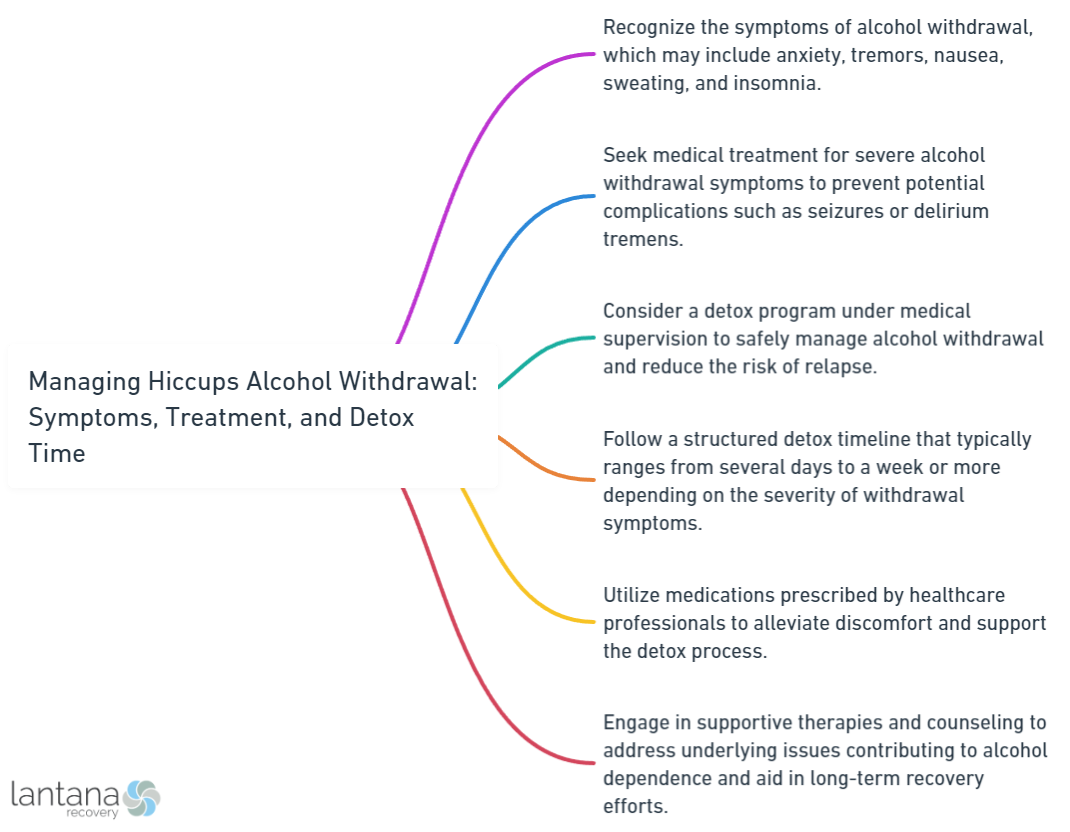If hiccups have been plaguing you during your journey to sobriety, you’re not alone. Hiccups are a common, yet often overlooked, symptom of alcohol withdrawal. But don’t let these pesky hiccups derail your progress. In this blog post, we’ll delve into the connection between hiccups and hiccups alcohol withdrawal, explore various treatment options, and share practical tips and coping strategies to manage hiccups during this challenging time. Get ready to conquer those hiccups and stay on track toward a healthier, alcohol-free life!
Key Takeaways
- Hiccups are a common symptom of alcohol withdrawal due to disruption of the central nervous system.
- Treatment options for alcohol withdrawal include medical detox, medication-assisted therapy and holistic approaches.
- Recognizing signs of abuse and seeking professional help can prevent hiccups and other severe symptoms associated with reducing alcohol consumption.
Hiccups and Alcohol Withdrawal: Understanding the Connection
Alcohol withdrawal syndrome is a clinical syndrome with potentially serious implications, affecting approximately two million Americans annually. It generally manifests during alcohol withdrawal, including acute withdrawal symptoms. High-risk factors and additional risk factors for complicated withdrawal are present in 3 to 10 percent of patients with alcohol dependence who experience hallucinations during severe alcohol withdrawal. Low levels of testosterone can occur during alcohol withdrawal. These low levels may be associated with psychological symptoms, like indecision, excessive worrying, and lassitude. The early stages of sobriety present a period of risk as the distress associated with acute and protracted withdrawal, including post-acute withdrawal syndrome (PWS), can be a strong motivator to relapse to alcohol use in recently detoxified patients, potentially leading to alcohol poisoning.
Hiccups are a frequent symptom of alcohol withdrawal and may be experienced by individuals undergoing detoxification. They occur when the body tries to adjust to the absence of alcohol, as the central nervous system is disrupted due to the sudden cessation of alcohol intake. To manage hiccups during alcohol withdrawal effectively, we need to explore their connection and the involvement of the central nervous system in the withdrawal process.
Hiccups as a Symptom of Alcohol Withdrawal
Hiccups are involuntary contractions of the diaphragm that cause a sudden intake of air, resulting in a “hic” sound. They are a common symptom of alcohol withdrawal as the central nervous system is disrupted when alcohol intake is suddenly discontinued.
The highest possible score on the CIWA-Ar scale (Clinical Institute Withdrawal Assessment for Alcohol) is 67, and a score of 8-10 or higher suggests the need for medical intervention.
Grasping how the central nervous system functions in alcohol withdrawal can illuminate the reasons behind the occurrence of hiccups during this phase.

The Role of the Central Nervous System
The central nervous system plays an integral role in the manifestation of alcohol withdrawal symptoms, including mild symptoms such as hiccups. Studies have shown that prolonged alcohol consumption has been observed to induce an adaptive increase in the function of NMDA receptors, which can lead to acute alcohol withdrawal symptoms when alcohol consumption is suddenly stopped.
“Several studies showed that ethanol potently inhibits NMDA receptors (NMDARs) and prolonged ethanol exposition leads to a compensatory “up-regulation” of NMDAR mediated functions. Therefore, alterations in NMDAR function are supposed to contribute to the development of ethanol tolerance, dependence as well as to the acute and late signs of ethanol withdrawal.” (Alcohol Related Changes in Regulation of NMDA Receptor Functions, József Nagy, 2008)
Alcohol impairs brain function and affects the way nerves interact with one another. Medical treatment is often necessary to manage withdrawal symptoms and support recovery.
Alcohol withdrawal seizures have been associated with increased NMDA receptor function, which may further enhance the neurotoxic and seizure-inducing effects of increased glutamate release during withdrawal. The central nervous system’s adaptation to the presence of alcohol and alteration of neurotransmitter production leads to the onset of alcohol withdrawal symptoms when the supply of alcohol is reduced or discontinued.
With a clear understanding of the central nervous system’s role in alcohol withdrawal, we can more effectively comprehend why hiccups and other withdrawal symptoms occur.
Common Symptoms of Alcohol Withdrawal

Alcohol withdrawal is the physical and psychological changes the body goes through after a person abruptly ceases heavy and prolonged alcohol consumption. Initial symptoms associated with alcohol withdrawal may include:
- Tremor
- Anxiety
- Insomnia
- Restlessness
- Nausea
However, the intensity of withdrawal is contingent upon the degree of physical dependency and the duration of excessive alcohol consumption.
Common symptoms of alcohol withdrawal may include:
- Body tremors
- Increased heart rate
- Feeling jittery
- Feeling shaky
- Sweating
- Feeling generally unwell
Recognizing common withdrawal symptoms, including mild withdrawal symptoms such as alcohol withdrawal nightmares, is key to seeking suitable treatment and effectively managing them during the withdrawal process.
Physical Symptoms
Physical symptoms of alcohol withdrawal may include:
- Insomnia
- Rapid heartbeat
- Changes in blood pressure
- Sweating
- Tremors
- Fever
These symptoms can range from uncomfortable to life-threatening, emphasizing the need to seek medical attention and adhere to a supervised detox process for a secure and successful recovery.
Psychological and Emotional Symptoms
Depressive symptoms are commonly observed during alcohol withdrawal. Anxiety, depression, and sleep disruption are also major psychiatric issues associated with alcohol withdrawal. In some cases, less common symptoms such as psychotic symptoms, delusions, and hallucinations may occur.
Dealing with these psychological and emotional symptoms of alcohol withdrawal is a significant part of the withdrawal process, given their substantial impact on a person’s overall wellbeing and recovery.
The Detox Process: Timeline and Stages

The alcohol detox process involves a series of stages and timelines, during which various withdrawal symptoms, including hiccups, may occur. The timeline and stages of the alcohol detox process include when hiccups might occur and how long they may persist. Understanding these stages can help individuals better prepare for and manage their withdrawal symptoms.
Hiccups usually appear during the peak stage of withdrawal, which typically lasts for a few days but can extend up to a week. Remaining vigilant and conscious of the potential risks and challenges tied to each detox stage is vital, given that the distress from acute and protracted withdrawal can strongly push recently detoxified patients towards alcohol use relapse.
Early Stage of Withdrawal
The initial stage of alcohol withdrawal comprises the following symptoms and duration:
- Tremor
- Anxiety
- Insomnia
- Restlessness
- Nausea
During this stage, maintaining fluid intake is crucial to prevent dehydration and electrolyte imbalances.
Proper medical care and support during this stage can help individuals manage their symptoms and progress through the detox process more comfortably.
Peak Stage of Withdrawal
The peak stage of alcohol withdrawal is the most intense stage, with the most severe symptoms. Delirium, characterized by confusion, severe shaking, hallucinations, and high blood pressure, is one of the most severe alcohol withdrawal symptoms.
The peak stage of alcohol withdrawal usually spans a few days, although it can last up to a week. Seeking medical assistance and support during this stage is vital for managing severe symptoms and ensuring a safe withdrawal process.
Late Stage of Withdrawal
The late stage of alcohol withdrawal is characterized by lingering symptoms and the transition to sobriety. Symptoms during this stage can include:
- Delirium tremens
- Hallucinations
- Seizures
- Severe agitation
As individuals navigate this stage, they may continue coping with lingering symptoms while acclimating to a life devoid of alcohol. The support from medical professionals, friends, and family can be instrumental in this stage to help sustain sobriety and deter relapse.
Treatment Options for Alcohol Withdrawal

There are various treatment options available for managing alcohol withdrawal symptoms, including hiccups. Prescribed medications such as benzodiazepines can be effective in reducing some of the withdrawal symptoms, recommends a clinical trial conducted among 22 899 inpatients is California. However, prescription recommendations should be carefully reviewed in light of the patient’s medical history.
Treatment facilities and specialists can provide 24/7 support throughout the medical detox process. This support is invaluable in relieving severe alcohol withdrawal symptoms. Various forms of alcohol detox programs make the journey to sobriety attainable for everyone. These programs provide easy access and help individuals get back on the right track.
Medical Detox
Medical detox is a process that involves the use of medical supervision to manage withdrawal symptoms. Medical supervision during alcohol withdrawal is critical as this period constitutes a time of great clinical risk that demands meticulous medical oversight.
Monitored detox can help to decrease severe alcohol withdrawal symptoms. It also offers 24/7 support throughout the medical detox process. Emergency medical care should be sought if severe symptoms of alcohol withdrawal syndrome manifest.
Medication-Assisted Therapy
Medication-assisted therapy is a comprehensive treatment program that incorporates the use of certain prescribed medications, such as diazepam or a similar medication, to assist individuals who are undergoing alcohol withdrawal. Antiseizure medications can fulfill the necessary criteria and have the ability to suppress kindling.
The antianxiety and mood-stabilizing actions of anticonvulsants may improve their effectiveness in treating withdrawal symptoms and may also assist in alleviating the spectrum of symptoms associated with post-acute withdrawal syndrome (PWS), potentially leading to fewer and less severe relapses during the time following acute withdrawal.
Holistic Approaches
Holistic approaches to alcohol withdrawal involve utilizing alternative medicine, such as acupuncture, meditation, and yoga, as well as addressing the person’s overall wellbeing, including the physical, psychological, and spiritual aspects of addiction.
Holistic methods provide a comprehensive treatment path for alcohol withdrawal, catering to the physical, psychological, and spiritual facets of addiction. Moreover, alternative medicinal practices like acupuncture, meditation, and yoga can be integrated into the treatment regimen.
While there are potential risks associated with holistic approaches, such as adverse reactions to alternative medicine or becoming overly dependent on the holistic approach, many individuals find relief and support in these methods.
Coping Strategies for Hiccups During Alcohol Withdrawal

Several coping strategies are available for hiccups during alcohol withdrawal, such as drinking fluids, taking a cold shower, and seeking support from others. These strategies can help alleviate the discomfort and annoyance caused by hiccups and allow individuals to better focus on their recovery process.
Acupuncture is a drug-free method that has been employed to address acute withdrawal symptoms resulting from narcotics such as heroin, opium, and morphine. Based on clinical observations, identifying the efficacy of acupuncture for withdrawal symptoms acupuncture can be a valuable and side-effect-free technique for effectively managing these acute withdrawal symptoms.
Deep breathing and the 4-7-8 breathing exercise are breathing techniques that can be used for hiccups during alcohol withdrawal. Deep breathing involves taking slow, deliberate breaths and concentrating on the breath as it enters and exits the body. The 4-7-8 breathing exercise is a technique that involves inhaling for 4 seconds, holding the breath for 7 seconds, and exhaling for 8 seconds in order to promote relaxation.
These breathing techniques, along with the other coping strategies mentioned above, can help individuals manage hiccups and continue on their path to sobriety.
Breathing Techniques
Deep breathing and the 4-7-8 breathing exercise are two effective techniques that can help alleviate hiccups during alcohol withdrawal. Deep breathing involves taking slow, deliberate breaths and focusing on the breath as it enters and exits the body.
The 4-7-8 breathing exercise is a technique that involves inhaling for 4 seconds, holding the breath for 7 seconds, and exhaling for 8 seconds to promote relaxation. By mastering these techniques, individuals can regain control over their hiccups and concentrate on their recovery.
Home Remedies
While there are no official home remedies specifically for hiccups during alcohol withdrawal, some general remedies for hiccups include holding your breath, drinking water, or swallowing a spoonful of sugar. These remedies may provide temporary relief from hiccups, allowing individuals to better focus on their recovery process.
However, if hiccups persist or are coupled with other worrisome symptoms, consultation with a healthcare professional for appropriate evaluation and treatment becomes a necessity.
When to Seek Medical Help
It is necessary to seek medical help for hiccups during alcohol withdrawal if they are persistent, severe, or accompanied by other concerning symptoms such as difficulty breathing, chest pain, or vomiting.
It is imperative to consult a healthcare professional for an accurate evaluation and treatment to confirm that the hiccups aren’t a result of an underlying medical condition and to obtain the most apt treatment for managing hiccups during alcohol withdrawal.
Preventing Hiccups and Other Withdrawal Symptoms

Preventing hiccups and other withdrawal symptoms begins by responsibly managing alcohol consumption and seeking professional help when necessary. Here are some steps to take.
- Identify the signs of alcohol abuse and seek early intervention.
- Consult with medical professionals or addiction specialists for guidance and support.
- Follow their recommendations to lower the risk of severe alcohol withdrawal symptoms and complications.
By taking these steps, you can significantly reduce the severity of experienced withdrawal symptoms.
Signs of alcohol abuse can include:
- Drinking in larger amounts or for longer periods than intended
- Having a persistent desire or making unsuccessful efforts to cut down or control drinking
- Experiencing withdrawal symptoms when alcohol use is stopped or reduced
By recognizing these signs and seeking help, individuals can work to prevent hiccups and other withdrawal symptoms, making the path to sobriety more manageable and successful.
Recognizing the Signs of Alcohol Abuse
It is important to identify the signs of alcohol abuse and seek help when necessary. Signs of alcohol abuse can include:
- Drinking in larger amounts or for longer periods than intended
- Having a persistent desire or making unsuccessful efforts to cut down or control drinking
- Experiencing withdrawal symptoms when alcohol use is stopped or reduced
If any of these signs manifest, it becomes necessary to seek assistance from a medical professional or addiction specialist to tackle the issue and prevent the onset of severe withdrawal symptoms.
Finding Support
Securing support is pivotal when dealing with hiccups and alcohol withdrawal. Such support can be found in therapy, support groups, and professional treatment programs.
Therapy can provide a safe environment to discuss feelings and experiences, while support groups can offer a sense of community and understanding. Professional outpatient treatment of alcohol withdrawal can offer medical and psychological support, as well as guidance and advice on how to cope with the symptoms of withdrawal.
Seeking support during this challenging time can greatly improve an individual’s chances of maintaining sobriety and preventing relapse.
Summary
In this blog post, we have explored the connection between hiccups and alcohol withdrawal, the role of the central nervous system, common symptoms of withdrawal, and the various stages of the detox process. We have also discussed treatment options, coping strategies, and preventative measures to help individuals manage hiccups and other withdrawal symptoms on their journey to sobriety. Understanding these aspects is crucial for successfully navigating the challenges of alcohol withdrawal and maintaining a healthier, alcohol-free life.
As you move forward in your recovery journey, remember to be kind to yourself, seek support, and utilize the coping strategies and treatment options discussed in this blog post. With persistence, determination, and the right tools, you can conquer hiccups and other withdrawal symptoms, ultimately achieving a life free from the grip of alcohol addiction.
Frequently Asked Questions
What are the causes of alcoholism?
Alcoholism can have many causes, including genetics, mental health issues, social pressure, and a family history of the disorder.
People who have experienced traumatic events, poverty, or limited access to resources are also at an increased risk of developing an alcohol use disorder.
What is the connection between hiccups and alcohol withdrawal?
Hiccups are a common symptom of alcohol withdrawal as the central nervous system adjusts to no longer receiving alcohol.
What role does the central nervous system play in alcohol withdrawal?
The central nervous system is an integral part of alcohol withdrawal, causing mild symptoms such as hiccups.
These symptoms can range from mild to severe, depending on the individual’s level of alcohol dependence. Symptoms can include anxiety, insomnia, nausea, and tremors. In more severe cases, seizures can occur.
What are some common symptoms of alcohol withdrawal?
Common symptoms of alcohol withdrawal include body tremors, increased heart rate, feeling jittery, shaky, and sweaty.
These symptoms can be mild or severe, depending on the individual’s level of alcohol dependence. Symptoms can start within hours of the last drink and can last for days or weeks. Treatment for alcohol withdrawal typically involves medications.
What treatment options are available for managing alcohol withdrawal symptoms, including hiccups?
Treatment options for managing alcohol withdrawal symptoms, including hiccups, include medical detox, medication-assisted therapy, and holistic approaches.








